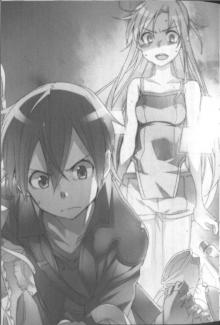- Home
- Reki Kawahara
The Black Dual Swordsman Page 17
The Black Dual Swordsman Read online
Page 17
Haruyuki swallowed this fleeting pain and gripped Lead’s hand tightly once more. Then he let go, took a step back, and looked around.
The plaza inside the Castle’s south gate. The first time he’d visited, it had been a Heian stage, and when he escaped, it had been a Purgatory stage, so it looked totally different again in the Moonlight stage, but the terrain was basically the same. A wide passageway stretched out to the north from the square plaza and led to the imposingly beautiful main building of the Castle. On either side of the passage, gothic-style circular pillars stood at regular intervals, and orange watch fires lit up the niches between the pillars.
But the atmosphere was decisively different from the last time. What exactly was it…?
As he furrowed his eyebrows, Metatron spoke up from his right shoulder. “In the memories of Silver Crow that I referenced, several hostile, high-level Beings were positioned at this point. Did you dispatch them, Lead or whatever you’re called?”
Right. That was it—when they’d broken in and when they’d escaped, Haruyuki and Maiden had had to work hard to stay hidden from the soldier Enemies/Beings that patrolled this place. But now, there was not a single Enemy, at least not that he could see.
Trilead was naturally surprised to hear his name from a ten-centimeter icon, but after blinking a few times, he answered politely, “No, it wasn’t me. I alone could never defeat the Enemies who guard this plaza.”
“You alone…But in the Castle…,” Haruyuki started to say, baffled.
And then Fuko beside him quickly lifted her face. Tracing her gaze, Haruyuki also looked up at the night sky.
There was someone at the top of a remarkably tall pillar that stood on the boundary of the plaza and the passageway. The armor was a black that melted into the night sky. But the pale moonlight caught and highlighted the outline of the sharp design.
“I have a very bad feeling,” Fuko murmured.
This someone casually leapt down from the pillar, likely twenty meters tall, and somersaulted in midair before making a perfect landing.
Haruyuki knew the inky avatar walking briskly toward them. There was no mistaking the figure he had fought only four days earlier in Shibuya. But there was no way he could be here. There was a reason why he couldn’t be here.
“How…?” Haruyuki groaned hoarsely, while Fuko beside him took a step and then another forward.
The black avatar stopped a mere two meters away from Fuko and made his greetings, voice and attitude both laid-back. “Hey Rekka, Crow. Long time no see. Or wait, I guess not. Four days no see. Maybe it’s my first time meeting the person on your shoulder, Crow? No…I kinda feel like we fought a real long time ago.” The avatar waved a lazy hand, the hilts of swords crossed on his back poking out from above his shoulders.
The first seat of Great Wall’s Six Armors. The Anomaly, Graphite Edge. There was no mistake. But how could he be inside the Castle in the Unlimited Neutral Field? Wasn’t he supposed to have been caught in an Unlimited EK on the God Genbu’s altar outside the Castle’s north gate?
Haruyuki stood stock-still, dumbfounded, and Trilead came up beside Graph to give him one further shock.
The young samurai avatar looked at Haruyuki and Fuko in turn as he uttered entirely unexpected words. “You all seem to be acquainted, but just in case, allow me to introduce you. This is Graphite Edge, my honored teacher. He guided me in sword usage and the ways of the world as a Burst Linker. He is also the parent who gave me the Brain Burst program itself.”
To be continued.
1
She painted the clear glaze on the strawberries spread out on top of the cream. The strawberry jam mixed into the glaze gave it a light-pink hue. She wasn’t particularly good with red liquids, other than food or drink, whether they were aromatic oils or detergents, but she wasn’t bothered by this faint saturation. She moved her hand quickly yet neatly to make the many strawberries shine with a brilliant luster.
Once she finished that task, she spun the marble turntable around and checked how it looked. The No. 6 size cake—eighteen centimeters across, in other words—was covered in pure-white cream with rings of strawberries arranged on top. The cream beneath them was laid out in a narrow lattice, which was where the name of the cake came from: le labyrinthe de la fraise, or the strawberry labyrinth. The selling point of this one was that when a piece was cut, there would be three strawberries on it.
Having finished her personal check, Mihaya Kakei lifted her face and spoke to the woman in her forties mixing cheesecake batter to her right. “Could you take a look?”
The woman—Mihaya’s aunt Kaoru Himi—set her bowl on the workstation and came over. She spun the cake around and smiled. “This is great, Myah. I’ll leave the rest of the labyrinths to you.”
“…N—” In her great relief, she very nearly said “NP” but quickly corrected herself. “Thank you.”
Once her aunt nodded and returned to her station, Mihaya let her mouth relax just a little. She didn’t normally smile that often, but she couldn’t help it just now. This was the first time she’d been told a cake she’d finished could go out into the store as is.
She moved the strawberry cake into the fridge and set a sponge cake on the turning table. She painted it with a palette knife, a bowl of fresh cream tucked under one arm.
Her movements were bold and delicate, but the important thing was the rhythm. In making a cake, in operating an electric motorcycle—and in fights in that world.
Her mind threatened to wander off, and she pulled it back to the cake in front of her. Today was Saturday, the day she visited the shop. The order was always the strawberry labyrinth. So the cake Mihaya was making now would go into her mouth. Any imperfections in the presentation might have an effect on the Territories in the evening. Of course, being one of the Kings of Pure Color, she wouldn’t stand directly on the battlefield, but she had the important job of putting together the teams and proposing the strategies to defend Nerima and neighboring Nakano.
And now she was here thinking about that again. Her aunt, the chief pâtissier, was very strict when she was wearing her chef coat, and if Mihaya did her work absentmindedly, she would send rebukes flying her way immediately. It had been over two years already since she started in the kitchen as an apprentice, but she still got yelled at a lot more than she got complimented.
But that was NP. That was the kind of person her aunt was, so Mihaya could relax and leave the kitchen in her hands. She’d never once felt anxious about the business she’d inherited from her father since she’d remodeled it into a Western sweets shop.
Yes. Mihaya, in tenth grade this year, was an apprentice baker cum waitress at Patisserie La Plage, and also the owner/operator.
Her father had run a café in Nerima’s Sakuradai neighborhood but passed away suddenly four years ago from an incurable heart condition called idiopathic dilated cardiomyopathy. It was the fall of Mihaya’s twelfth year.
Although it was indelicate, Mihaya was surprised at the number of relatives who appeared at the funeral. Her father had been a playboy who loved coffee and motorcycles and had been treated like the black sheep of the Kakei family, many of whom worked in conservative industries, so they’d had almost no contact with his family.
She somehow made it through her duties as chief mourner and fell into a daze, but she wasn’t given the time to chew on her sadness at home alone. At the first meal after the funeral, her aunts and uncles immediately began to discuss her future.
Her father, on his sickbed, had created a formal will after talking with a reluctant Mihaya any number of times about what would happen after he died. Because her mother had passed away a long time ago, Mihaya would inherit the land and store in her father’s name and his considerable amount of savings. Additionally, the national conservatorship law applied, and Mihaya would enter a full boarding school in Nerima until she graduated from junior high. That was all in the will.
When Mihaya told them this, the aunts and uncles cr
ied “Unthinkable!” as one and insisted that a child needed a family, that one of them would take her in. Mihaya said she didn’t want to leave the house, and they tried to tear her down with logic.
Inheriting property cost an incredible amount in taxes, so they told her she should take this opportunity to dispose of the house, the land, and one bright-red Italian electric motorcycle. They would carefully manage the money for her until little Mihaya came of age.
Now that some years had passed, she believed that they had spoken with good intentions. No matter the household, the burden of taking in a child who was about to start junior high was large. So Mihaya was actually surprised at the number of relatives who said she should come live with them. She had been surprised and grateful but had no intention of becoming the child of the people who hadn’t understood her father and his way of life.
Mihaya held off on answering them right then and there. She told them she was too sad about the death of her father, and the day had been long and exhausting; she needed a little time to think. The aunts and uncles agreed to this reluctantly, exchanging looks with one another, and went back to the hotel in Ikebukuro after telling her they would come again the following evening.
The next morning, Mihaya started to move. She went to see her aunt, the only one of her father’s four siblings who simply disappeared when the funeral was over, Kaoru Himi.
When she went to visit her aunt, the pâtissier at a cake shop at a major Akasaka hotel, she did not ask her to take her in, as her father had told her to. Instead, she headhunted her. She said she was going to renovate the café her father had left her to open a Western-style cake shop, and she wanted her aunt to be the chief pâtissier.
She didn’t think her aunt would simply say yes when she had a position with responsibilities at a famous kitchen. Mihaya had resolved to give up on the idea if she asked three times and got a no three times, but her aunt asked her only one question.
“Are you making the café a Western cake shop to bring me in?”
“No, that’s not it.” Mihaya rejected this immediately. “It was my parents’ dream to open a cake shop there. Until my mother got sick and passed away when I was a baby.”
Her aunt had thought about it for a full minute before finally replying briefly, “All right.”
Not long after, Mihaya had asked her aunt why she had so readily accepted this large request, one that would change the course of her aunt’s life, who was still in her thirties. Kaoru had given her an answer with a smile:
Mihaya’s father, her aunt’s younger brother, had told her nothing except “If something happens, take care of Mihaya.” And back when Mihaya’s mother was newly married to her father, she and Kaoru had exchanged a promise to help each other out when they opened their own cake shops. This was long before Mihaya was born, when her aunt and her mother were studying at the same cooking school. That was when Mihaya first learned that Kaoru was the one who had introduced her mother to her father.
The other aunts and uncles definitely did not seem pleased by this choice, but it was no longer at the stage where they could voice any objection. That evening, they all went home to Osaka or Sendai, and in their place, Aunt Kaoru and her daughter, Mihaya’s cousin two years her junior, came to visit the house/shop in Sakuradai. She had absolutely no idea that this cousin would change her life as definitively as her aunt.
Her aunt opened the door toward creating the cake shop that had been her parents’ dream. Her cousin gave her a world to sublimate the sadness she’d been pushing down for so long.
Her name was Akira Himi. She’d been in fourth grade at the time, but with her very short hair, hoodie, and twill pants, together with the simple shape of her glasses, she had a slightly androgynous air.
Only the adults had been part of the procession at her father’s funeral, so it had actually been two years since she’d seen Akira. For elementary school students, two years was an incredibly long time, and Mihaya and Akira were both far from chatty, so Mihaya felt a little awkward when they ended up alone at some point.
But Akira was almost mysteriously calm, and after staring at Mihaya for a moment with her quiet eyes somehow reminiscent of the bottom of the sea, she offered her a certain something. Not a physical object, but a program. The key to releasing her soul and accelerating.
In the strange world she visited in the garage behind her house sitting alongside Akira on the seat of the large motorcycle, Mihaya finally cried. She cried and cried and used up a lifetime’s worth of tears.
In the four years since then, Mihaya had not shed a single tear. Not in the real world, not in the Accelerated World.
She didn’t have the time to cry. The hours flowed past with a ferocious speed. Even when her mind was accelerated a thousand times, that flow did not stop. She had to keep running straight ahead at the limit of the speed she could produce. Like a leopard racing lithely through a grassy field.
2
Naturally, she had school on weekdays, so she could only help with the evening preparation, but on Saturday mornings, she was full-on in the kitchen, and in the afternoons, she changed into her waitress uniform and worked the counter.
Mihaya wanted to focus on making cakes, but her aunt thought she should also get experience in customer service if she was going to become a pâtissier. It was pretty difficult for her to smile in a friendly way, but once she tried it, she also enjoyed working in the front. Especially when she saw the children with their eyes shining before the many-colored cakes lined up in the showcase, and her heart was filled with a mysterious warmth.
The problem was that the uniform her aunt proposed was the modern maid look, but she’d been forced to accept it when Kaoru told her it was the design her late mother had sketched during their student days. It was surprisingly very popular with the other two counter girls, and after wearing it for three years, she’d gotten used to it.
The strawberry labyrinth Mihaya had decorated in the morning—her aunt had baked the cake—was essentially sold out by three in the afternoon; there were only two slices left. A little on edge, she kept glancing at the clock on her virtual desktop when, right before her shift was ending at three thirty, she heard a synthetic chime modeled after a doorbell.
Slipping into the shop before the door was fully open was a small girl in a white blouse and a navy pleated skirt. The uniform of the elementary division of the boarding school Mihaya had also attended.
“Welcome.” Her internal relief and anticipation couldn’t have been audible in Mihaya’s voice, but the girl met her eyes and smiled mischievously. The red hair tied up on either side of her head swinging, she approached the showcase on quick feet and peered in, almost pressing her freckled nose against the glass.
Listening with a smile to the sound of the tablet and other educational materials shifting inside the red backpack, Mihaya waited for her order. That said, she already knew what the girl would have.
“Yesss!” The instant she spotted the two remaining slices of strawberry cake, her face lit up. “There’s some left! Can I have a labyrinth?!”
“One piece of strawberry labyrinth, yes? Please wait just a moment,” she responded politely—she definitely couldn’t just say “gotcha” when she was in uniform—but omitted the eat-in or take-out question. She readied a plate rather than a box and opened the refrigerated case.
As she carefully moved a piece of the labyrinth to a plate with a cake server, she heard the chime of the automatic door once again. Then the sound of multiple feet approaching forcefully together with energetic shouts.
“I’m doing the strawberry larynx!”
“I want strawberry, too! Loads of strawberries!”
The new customers were young girls, about five or six years old. A woman who was likely their mother entered the store behind them. After Mihaya called out “Welcome,” she left the rest of the customer service to the other waitress and started to move toward the register. But there, she anticipated another problem.
The tw
o girls, apparently sisters, had simultaneously realized that the “strawberry” in the case was the last slice. They looked at each other and fell silent as if measuring the timing before crying out in unison.
“I want strawberry!”
“No! I said it first!”
“Noooo! Strawberryyyyy!”
Tears immediately sprang up in the eyes of the younger sister, and the mother came up behind them with a furrowed brow, likely about to say something along the lines of “You’re the older one. You need to be nice to your sister.”
And then the girl with the red backpack who had ordered the labyrinth first smiled lightly as she said to Mihaya, “Sorry, order change. One cherry tart.” She gently patted the head of the child in tears squatting next to her. “C’mon, look. There’s two strawberries now.”
Mihaya quietly moved back to the case and returned the labyrinth plate. Once the case was closed, the younger sister’s eyes grew wide.
“There’s two! Mommy, there’s two strawberries!”
The redheaded girl stood up with a smile and gave a light bow to the mother, who was dipping her head apologetically.
Mihaya took the cherry tart off another shelf and set it on a plate before moving to the register once more, feeling a sad sort of pain.
The girl who had ordered the strawberry cake first was in sixth grade. Compared with the kindergarten-aged sisters, she was much older, but she was still of an age where the world in general regarded her as a child. No one would have reproached her for not giving up the cake she’d been looking forward to for a whole week.
But she wouldn’t—or couldn’t—ignore the tears of a child in that situation. Any such childishness had long ago disappeared. The subjective time the eleven-year-old girl had experienced was most likely far greater than that of sixteen-year-old Mihaya.

 Signal Fire at the Water’s Edge
Signal Fire at the Water’s Edge Alicization Uniting
Alicization Uniting Sword Art Online Progressive 5
Sword Art Online Progressive 5 Cradle of Stars
Cradle of Stars Archangel of Savage Light
Archangel of Savage Light Alicization Lasting
Alicization Lasting The Black Dual Swordsman
The Black Dual Swordsman Alicization Rising
Alicization Rising Alicization Dividing
Alicization Dividing Pull of the Dark Nebula
Pull of the Dark Nebula Snow White’s Slumber
Snow White’s Slumber Sword Art Online - Volume 7 - Mother's Rosario
Sword Art Online - Volume 7 - Mother's Rosario Fairy Dance 1
Fairy Dance 1 The Igniter
The Igniter Aincrad 2
Aincrad 2 Fairy Dance 2
Fairy Dance 2 Sword Art Online Progressive 4
Sword Art Online Progressive 4 Accel World: Flight Towards the Blue Sky
Accel World: Flight Towards the Blue Sky Sword Art Online - Volume 9 - Alicization Beginning
Sword Art Online - Volume 9 - Alicization Beginning Accel World: Crimson Storm Princess
Accel World: Crimson Storm Princess The Binary Stars of Destiny
The Binary Stars of Destiny Aincrad 1
Aincrad 1 Sword Art Online - Volume 1 - Aincrad
Sword Art Online - Volume 1 - Aincrad The Floating Starlight Bridge
The Floating Starlight Bridge Sword Art Online Progressive 2
Sword Art Online Progressive 2 The Red Crest
The Red Crest Sword Art Online - Volume 2 - Aincrad (Side Stories)
Sword Art Online - Volume 2 - Aincrad (Side Stories) Alicization Turning
Alicization Turning Flight Toward a Blue Sky
Flight Toward a Blue Sky Accel World: Floating Bridge in Starlight
Accel World: Floating Bridge in Starlight Sword Art Online - Volume 8 - Early and Late
Sword Art Online - Volume 8 - Early and Late The Biter
The Biter SAO 15 - Alicization Invading
SAO 15 - Alicization Invading Accel World: Return of Princess Snow Black
Accel World: Return of Princess Snow Black The Twilight Marauder
The Twilight Marauder Mother's Rosary
Mother's Rosary Sword Art Online - Volume 4 - Fairy Dance
Sword Art Online - Volume 4 - Fairy Dance Sword Art Online Progressive
Sword Art Online Progressive The Seven-Thousand-Year Prayer
The Seven-Thousand-Year Prayer Early and Late
Early and Late Sword Art Online Progressive - Volume 01
Sword Art Online Progressive - Volume 01 Sword Art Online Progressive 3
Sword Art Online Progressive 3 Sword Art Online - Volume 5 - Phantom Bullet
Sword Art Online - Volume 5 - Phantom Bullet Sword Art Online - Volume 10 - Alicization Running
Sword Art Online - Volume 10 - Alicization Running Elements
Elements Shrine Maiden of the Sacred Fire
Shrine Maiden of the Sacred Fire Phantom Bullet 1
Phantom Bullet 1 The Red Storm Princess
The Red Storm Princess Kuroyukihime’s Return
Kuroyukihime’s Return Accel World: Dusk Robber
Accel World: Dusk Robber Alicization Running
Alicization Running Armor of Catastrophe
Armor of Catastrophe Sword Art Online - Volume 6 - Phantom Bullet
Sword Art Online - Volume 6 - Phantom Bullet Volume 16
Volume 16 Sword Art Online - Volume 3 - Fairy Dance
Sword Art Online - Volume 3 - Fairy Dance Alicization Beginning
Alicization Beginning Sword Art Online Volume 17 - Alicization Awakening
Sword Art Online Volume 17 - Alicization Awakening Sword Art Online Progressive 1
Sword Art Online Progressive 1 The Trancer
The Trancer Phantom Bullet 2
Phantom Bullet 2